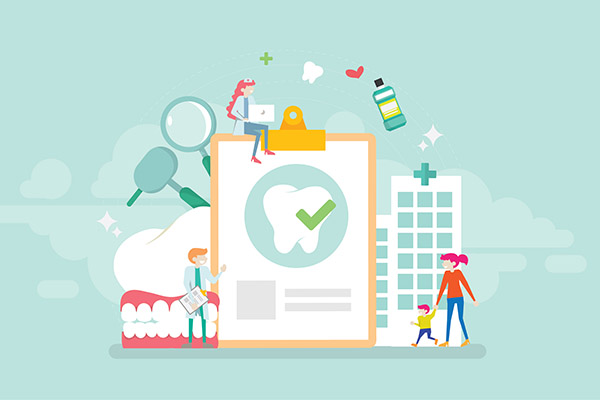Make an Appointment with a Family Dentist Today

Regular dental checkups are vital to keeping your teeth and gums healthy. You should visit your family dentist at least once every six months. This includes both adults and children alike. Routine dental appointments are essential for good oral health and they offer many important benefits.
Tartar removal is an important step in dental appointments that significantly reduces the risks of developing tooth decay. During a checkup, your dentist can also search for early signs of serious dental problems, such as cavities, infections, gum disease, bone loss, and even oral cancer. Many of these issues can be detected by a dentist long before symptoms arise. When caught early, you will likely have significantly more treatment options to choose from. There is also a much better chance of a more favorable outcome in the end.
Dentists can also offer optional preventative treatments that reduce your risks of developing tooth decay in the future. Topical fluoride treatments and dental sealants are some of the most commonly used treatments. For many people, sticking with a set schedule to visit the dentist helps reduce or prevent the development of dental anxiety. In fact, this is one of the reasons why seeing a dentist during childhood can be so important.
Because routine visits can help protect your teeth and reduce your risks for serious oral health issues, they should be a priority for people of all ages. Once the first baby teeth erupt, around age one, everyone should start seeing a dentist twice a year for a professional cleaning and examination. Here is an overview of what to expect at your semiannual oral health care appointments.
What to expect at your dental appointments
There are two parts to a regular dental visit; the checkup and the cleaning.
Checkup
Your family dentist will check your teeth for cavities and other dental issues. Normally, at every other appointment (once annually), X-rays will be taken to better detect tooth decay. Your teeth will also be checked for plaque and tartar. Plaque is a sticky layer of bacteria that hardens to become tartar if left unattended. Because tartar is hard, it cannot be removed by brushing and flossing and must be removed by a dental professional. Further, plaque and tartar cause more oral diseases. To avoid these unpleasant conditions, seek regular treatment with your family dentist.
In addition to the removal of plaque and tartar, your dentist will check your gums. The depths of the space between teeth and gums should be measured. Thicker spaces indicate gum disease, which should be treated promptly.
A thorough oral examination will also involve checking your tongue, throat, head, neck, and face for redness or swelling. This should be taken seriously as any of these could be indicative of cancer. Your family dentist will refer you to another professional in the appropriate field if anything troubling is visible.
Cleaning
At your semiannual dental visits, expect your teeth to be cleaned by your family dentist. Using a tiny round mirror, the dental hygienist rids the teeth and the gum line of plaque and tartar. The better you care for your teeth at home, the quicker this process will be.
Once your teeth are free of plaque and tartar, the hygienist utilizes a powerful electric brush to polish them. This tool is noisy but does an excellent job of cleaning and eliminating anything the scaling tool missed in your mouth. A gritty paste is used for the polishing procedure. This paste should only be used by professionals as the texture can wear down tooth enamel if used too frequently. The last step of your cleaning is typically thorough flossing. Once the dental hygienist has meticulously cleaned your teeth, the family dentist will take a look and review any images taken.
What to do between dental visits
To make your trips to the family dentist as painless as possible, take good care of your mouth each day. Ask your oral health care professional for recommendations specific to your needs. Generally, you should:
- Brush teeth twice daily with fluoride toothpaste for at least two minutes
- Floss teeth at least once per day
- Mouthwash after you brush
Conclusion
To keep your family's smiles clean and bright, keep regular appointments with a family dentist. Expect a detailed cleaning and checkup at each session with X-rays performed annually. For faster appointments and less discomfort, take the time to care for your teeth and gums properly at home.
Request an appointment here: https://drdavidbrumbaugh.com or call R. David Brumbaugh, DDS at (214) 306-4402 for an appointment in our Dallas office.
Check out what others are saying about our dental services on Yelp: Family Dentist in Dallas, TX.
Related Posts
Proper dental care is important for the overall health of your entire family. Routine oral care from a family dentist can have an impact not just on the appearance of your teeth and gums, but on their function as well. Dental health can also affect many systems of the body and should be prioritized to…
Taking young children to the family dentist can be overwhelming at times, especially because they are more prone to dental fear and anxiety. However, dental care is essential for children, just as it is for adults, and should start at a very young age. The American Dental Association recommends that children visit the dentist as…
Dental problems can happen at any time and often require immediate help to relieve pain and avoid potential complications. If you have urgent dental concerns, you might look for an emergency dentist or a same day dentist. Knowing the difference between these dental professionals can help you choose the best option for your needs.An emergency…
Medical hospitals are often unequipped to handle dental emergencies; this is when an emergency dentist becomes necessary. Recognizing the signs of a dental emergency is important for patients to get the help they need right away. Once patients know they are dealing with a dental emergency, they can look up “emergency dentist near me” instead…


